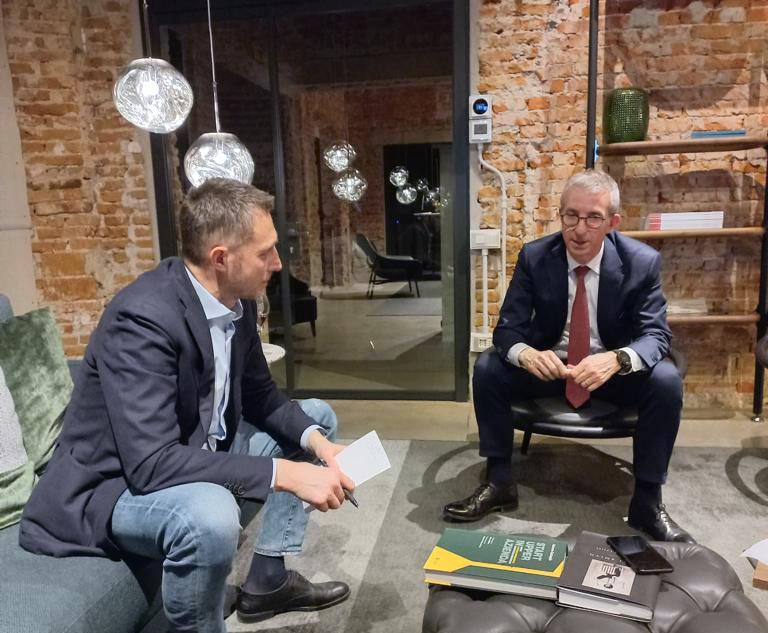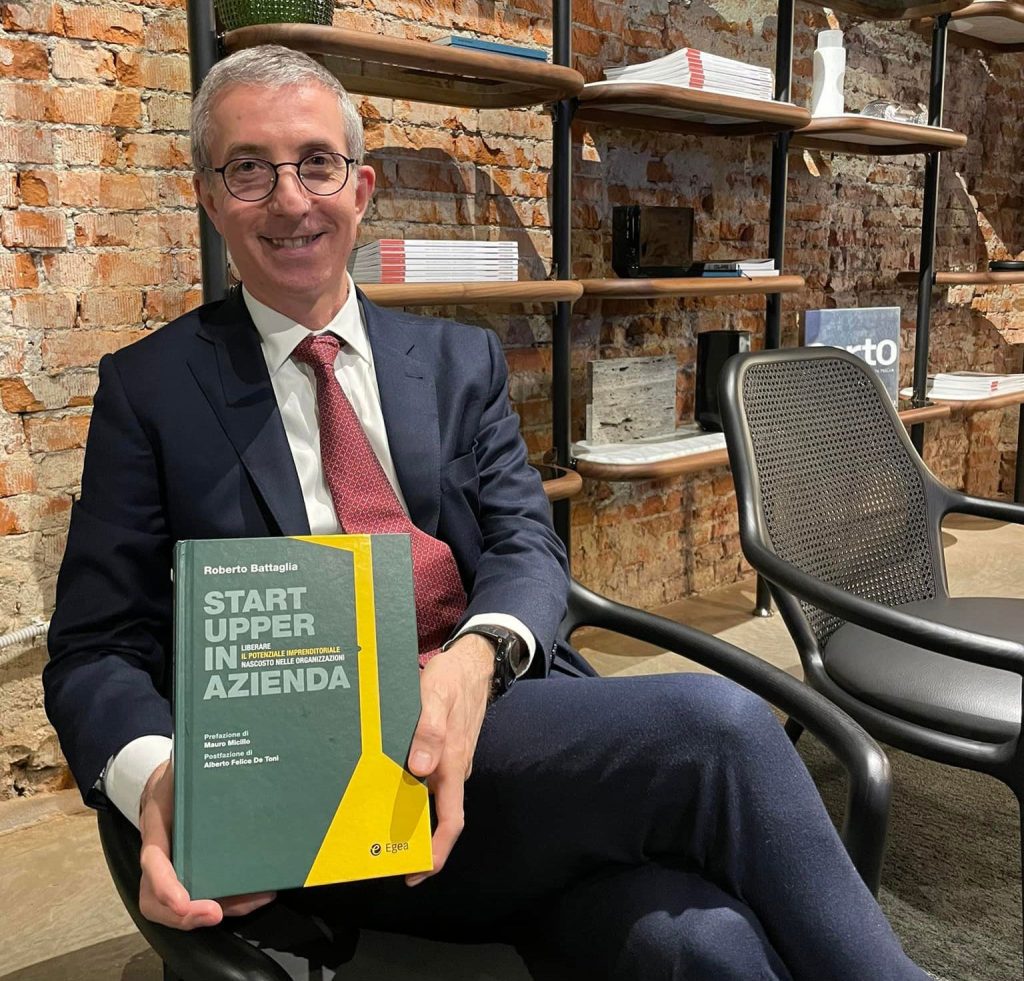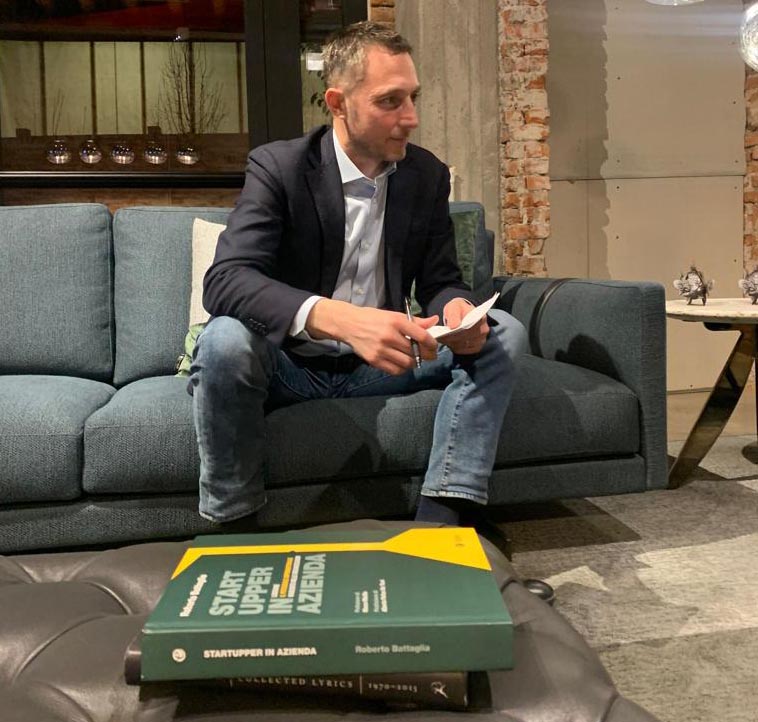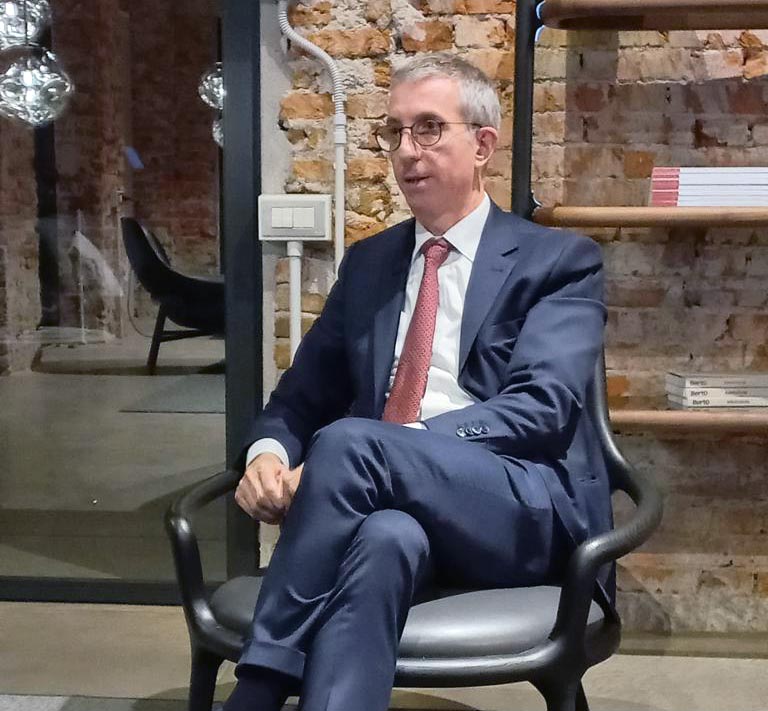Filippo Berto’s first meeting with Roberto Battaglia (Transformation Lead and IMI Corporate & Investment Banking at Intesa Sanpaolo) took place on the occasion of the publication of his book “Startupper in Azienda”, to which we are proud to have made a contribition with a major focus on people, as evidenced in the chapter titled:
BertO’s people: real value that transcends spaces, rules and tools
And, as you’ll see from reading the interview, it is people who are absolutely the focus of the work of Roberto Battaglia, who we met on the occasion of the release of his book.
People: often young people, often restless and talented people, often people who want to fully express themselves in their work by giving their all: to us, Roberto’s mission can be summarised in what he himself frequently repeats:
I take care of people
and he does so in an extraordinarily interesting way and with full commitment, his enthusiasm infecting all of us during a long and fascinating chat at the BertoStudio laboratory at LOM – Locanda Officina Monumentale, in Milan.
The conversation between Filippo and Roberto was a continuous reference to each of their experiences, always seen in terms of ideas for growth, moving forward and better understanding a world (a world of human resources) that is becoming more and more distant to what we are so far used to.
To consider it an interview is perhaps a slight understatement, given how intense the meeting was.
This is what their conversation was all about.

Filippo Berto: Who is Roberto Battaglia?
Roberto Battaglia: I’ve been dealing with people for many years, primarily within a financial company called Intesa San Paolo.
I spent a huge part of my life in the world of banking, which at one time was called a “petrified forest” but which today has changed significantly.
I’ve always tried to do this work with attention to that concept, which is and always remains the most important beyond any norms, contracts, salaries, etc., that is to say, the day-to-day management of HR activity, namely of the person and their own overall growth.
Over the course of my career I’ve fallen in love with the concept of experience design, first applied to training and then to the management of people. In fact, I think that as learning is something acquired not only during traditional training session (which we do a lot of in the company), but also before and after the training is completed, so it is very important for people to take into account all aspects of professional life (and sometimes not just that).
Look, I like to think of addressing the topic of Design applied to people’s abilities based on a fundamental concept: talent not only needs to be trained, it needs to be challenged.
I think that a company’s potential is always present, but not always necessarily visible. This is because of a part of all of us has skills that are not at all expressed when we’re at work.
My job is to find the right ways of bringing this unexpressed talent to the fore.
FB: In summary, what do you recommend to young people entering the world of work?
RB: I recommend tow very specific things: diet and exercise.
By this I mean two approaches to the world around them…
When I say ‘diet’, I mean an information diet. The Internet is a democratic machine where, if you find the right access keys, you can find literally everything.
A graduate with a perfect grade point average cannot and must not feel like they’ve “arrived”. In the world we live in, no-one should ever feel just “fine”: what is needed is a will to understand more, to take an interest in things, to study, to seek things out that are different from what you know, launch yourself into not-so-obvious projects, imagine pathways that can surprise you and be able to take a step back and then return. In other words: someone who explores.
The other thing is “exercise”. By that I mean to physically moving, going out and experiencing things, physically living and experiencing the world we’re living in, absorbing its stimuli in a dynamic way, exploring unthinkable and even possibilities and, better still, by not staying still. There is nothing for those who stand still, because the world of work (and the world in general) moves in an incredible way.

FB: What is your point of view on companies and how they should regulate themselves in managing people?
RB: I have to congratulate you here, Filippo, because the things you do with BertO fit fully with my vision of how companies should act regarding “knowing how to involve the right people for the right job“.
There are a couple of concepts that link back to what you do, in relation to my own thoughts, which can also be found in the book, namely:
Online Strategies. Ability to think outside the box. Innovative story-telling.
Online Strategies: you could teach them, you’ve practised it so much, even before it was standard, so it’s no coincidence that you’re now Case Study Google!
Since you, you personally, Filippo, started the first Italian corporate blog on Design in 2004 (BertoStory!), right up to the conception of a constant relationship with the customer, the result of a mentality of rapport and dialogue, which is a product of that working method, you are the embodiment of online strategies.
Ability to think outside the box: without going into too much detail, a good example for everyone of knowing how to do things yourself is crowdcrafting, particularly the first crowdcrafting project, DivanoXManagua: that experience had so much stuff going on, as well as so much experimentation!
I quote them in no particular order, but you could easily write a book about all of them: direct client participation; opening up the inner sanctum of the craftsman, the laboratory; cross-pollination between those who make and those who buy; on-location meetings; the extensive promotion of a craft or profession and internationalisation.
Expressed in this way, all these things seem to have come out of a book, but the great thing is that you yourself have put them into practice, not only in Meda but also in Milano, New York, etc., and then, most important of all, you have implemented them by making crowdcrafting your current market strategy.
And finally, innovative storytelling.
I really love when you say “alongside the artisan workshop, we’ve also created the storytelling workshop“!
You know, most companies and brands, even the “sexiest” ones, often express themselves in ways that are ultimately quite traditional; they might create remarkable content but always in a rather standard format, the same as everyone else, with a basic approach that in reality doesn’t differ from the others.
Then there are the exceptions, those who really innovate the way they express themselves, and even here I fully see myself in what you do and what you have always done, be it online or not.
You understand the underlying credibility very well and you can sense there’s not only a strategic plan, but also sincere and direct participation, above all by you, but also by your working group.
Authenticity is a very powerful lever, something that people feel and understand.
All this is also very valid in terms of attracting talent, as this concerns those who want to approach your company to work there.
FB: Your experience is remarkable and the value you have brought and continue to bring to the world of Finance is evident throughout your long career. Do you think what we are talking about – online strategies, the focus on people and the challenge of talent – is particular to your sector or can it also be applied to other sectors?
RB: No doubt about it, this open, provocative, restless approach, whatever you want to call it, concerns all sectors without exception.

FB: In our small contribution to your book, we talked about the people of BertO, who in our opinion know how to go beyond: beyond spaces, beyond rules and beyond tools…what do you think of this vision?
RB: Personally I think that “going beyond” is the only way a company can continue on the market today.
I’m aware of the difficulties faced by entrepreneurs who have lots of things to take care of just when it comes to everyday life, but it’s vital to be able to see beyond, think beyond and do beyond.
In this sense, the possibility of “rendering yourself useless“ is a significant worry for someone who, like you, manages a company.
Let me explain: if the head of a company, the individual or group of individuals that has decision-making responsibilities, is 100% occupied with ordinary management duties, the seemingly endless amount of day-to-day tasks, it wil be difficult for them to apply higher thoughts, ones which can really advance the company.
This is why those in management should know how to go “beyond themselves”, or rather, “go beyond their own role” in order to apply their entrepreneurial talent to future thoughts.
I don’t want to simplify, also because I know all too well how this is almost impossible, even heroic, I’d say, for those who head companies today, but in my opinion this is important.
I focused on “going beyond” for entrepreneurs, but it’s obvious that if the entrepreneur thinks this way, the people around him will not be so different in their approaches. That’s why I really do see myself in you!
FB: Speaking of people’s approaches to work in 2022, we can’t forget to mention one of the most important phenomena of our times in this area: the so-called “Great Resignation”, which is causing more and more people to leave their jobs without a ready alternative. What can you tell us about that?
RB: It’s a phenomenon that is becoming more and more important.
I think the fact that many people are refusing to go back to the “old ways” after experience a new way to work during the pandemic teaches us that people are no longer willing to sacrifice their talent.
Bear in mind that most of these people are younger people and this is also something being felt a lot in Italy.
Without a doubt one of the most important signals of our times, and of enormous importance.
Thank you Roberto!
Talking with you have been a real pleasure that I don’t think I’ll ever forget. See you next time and thank you again for coming to talk to us!

Ask now for your personal consultation and create your own furnishing project with one of BertO’s Made in Meda interior designers
